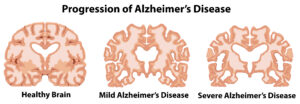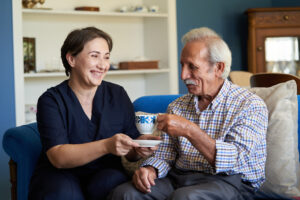
30 Nov A Caregiver’s Guide to Dementia Care During the Pandemic
How to provide effective care for someone with dementia during the COVID-19 outbreak.
Dementia refers to a group of cognitive and behavioral symptoms that form as a result of declining function in the brain. Caregiving for someone with dementia is a tough role, particularly in the face of the coronavirus pandemic.
Alzheimer’s disease is the top cause of dementia in seniors. The Centers for Disease Control and Prevention (CDC) finds that older adults additionally have an increased risk for severe complications from the novel coronavirus disease (COVID-19). In fact, adults 65 years or older account for 80% of deaths due to COVID-19 in the United States.
Below, we discuss tips and best practice in caring for someone suffering with dementia during the COVID-19 pandemic.
Family caregiver challenges during the COVID-19 pandemic
Preventive measures against the novel coronavirus currently in effect, such as social distancing, often create significant challenges for people with dementia. This is because, like many seniors, they generally rely on in-person health services and social support from family members and friends.
A person with dementia may have trouble comprehending the COVID-19 pandemic or its implications. Many caregivers, typically relying on regular visits from family members and friends, may find themselves taking on more responsibilities without help or breaks.
Accordingly, family members in place as the sole caregiver may experience caregiver burden and stress that can take a heavy toll on individuals.
The challenges that stem from dementia vary depending on the type and severity of a person’s condition.
Types of dementia
Alzheimer’s disease
Alzheimer’s disease targets regions of the brain that have a role in the formation of memories.
People living with Alzheimer’s disease may find it problematic to remember recent events or perform daily tasks, like bathe or wash their hands.
Frontotemporal dementia
Frontotemporal dementia is another type of dementia. It has symptoms that correlate either to changes in behavior or speaking and language difficulties.
Seniors with frontotemporal dementia may display inappropriate or impulsive social behavior. Accordingly, they may not follow social distancing, proper hand hygiene practices, and other recommendations provided by local authorities or under the direction of their caregiver.
Lewy body dementia
Older adults afflicted with Lewy body dementia or Parkinson’s disease may display progressively worsening memory loss, impaired speaking, or changes in mood and personality. It is often difficult for them to communicate their needs or concerns to caregivers.
Effective ways to provide caregiver support for loved ones living with dementia
A family caregiver can use the following tips to help care for someone with dementia.
Be prepared for gaps in caregiving support
Family caregivers may be forced to shoulder the burden of greater caregiving responsibilities. In some cases, they may find that home health aides or other members of the family are unable to come by as frequently.
They may best prepare for unexpected gaps in care through having on hand plenty of essential supplies. Medications, hygiene products, and plenty of food are recommended. When dealing with food and other items, make sure to stock up on essential supplies that are nonperishable. Our guide to long-distance caregiving as well as planning for emergencies are great additional resources to help you prepare.
Family caregivers should help dementia sufferers establish a daily routine
It is often advantageous to create a regular daily routine inclusive of some or all of the activities listed here. Some activities to consider making a part of your senior loved one’s routine include:
- Have set times for going to bed and waking up.
- Dressing, taking baths, and other personal care activities. Bathing can be a challenge for dementia sufferers. Take a look at our tips for bathing here.
- Meals and cooking
- Set times for breaks or naps
- Time to interact and socialize with loved ones
- Routines for activity and exercise
- Relaxation time and other hobbies
Minimizing stress for those living with dementia or Alzheimer’s
It’s crucial to highlight and promote any activities that do not agitate individuals with dementia. For example, if a senior becomes withdrawn, confused, or frustrated when they are away from home or another familiar and comfortable setting, highlight the activities that they can do at home. There are several ways that caregivers can create a stress-free and calm environment, such as keeping the individual’s space and home free of harsh lighting and distracting or disruptive noise.
It’s important for caregivers to try and stay positive and calm, even though at times it will likely be challenging. This is particularly true if an individual with dementia becomes agitated or angry. In instances like these, it could be helpful to ask them about whether they want or need support.
If trying to talk with the person does not help, caregivers can attempt to redirect the situation. For instance, they could try suggesting a different activity or ask that person whether they want to move somewhere else in the house.
Utilize visual cues and repetition
If you don’t already know, individuals can help in preventing the transmission of and protect themselves from COVID-19 by:
- Minimizing close contact with people that have contracted the virus
- Properly covering their mouth and nose when they cough or sneeze
- Not touching their mouth, eyes, or nose
- Frequently disinfecting and cleaning used and high-touch objects and surfaces
- Effectively washing your hands regularly with soap and water
- Applying alcohol-based hand sanitizers
Learn about our top hand washing tips laid out in detail here.
Seniors with dementia may need more support and visual cues that help them remember these essential hygiene practices. Caregivers are strongly suggested to consider practicing thorough hand washing with the person (along with their own regular hand washing and sanitizing).
They could also put a bottle of alcohol-based hand sanitizer in an easily accessible spot. Next to the bed, on the coffee table, and the kitchen table and counters are just some ideas.
Evaluate the physical health of those with dementia or Alzheimer’s
Older adults living with dementia may not always effectively and clearly communicate their needs and requirements to others. As a result, caregivers should regularly monitor the senior’s physical health. Be sure to pay attention to any signs of injuries, like skin cuts or lesions, bruises, and pressure wounds. These are more common in older adults and those with dementia are often at greater risk.
COVID-19 symptoms for family caregivers to monitor
Just having a dementia diagnosis doesn’t indicate that someone will get infected with COVID-19. That being said, the cognitive symptoms and challenges associated with dementia can make it challenging to follow the government’s advice and best practices for avoiding infection.
As a caregiver, you should always be on the lookout for new or progressively worse symptoms of dementia. Not only could it show progression of the disease, but it is also often the first sign that a person with dementia is experiencing infection or an illness. Some examples of symptoms you might see include increased confusion or a loss of coordination. As the pandemic continues to unfold and stretch out for an unforeseen amount of time, caregivers should also be on the lookout for other signs of infection, like fever, a persistent cough, or difficulty with breathing. Some additional symptoms may include a loss of smell or taste, sore throat, or muscle pain. In addition, some individuals have observed or experienced gastrointestinal symptoms, including diarrhea, nausea, and vomiting.
Stay on top of evolving information about COVID-19
Be sure to stay updated on the latest news and information on the coronavirus. While we are beginning to learn more and more about the virus, there continues to be a lot of research and updates coming out that are beneficial for caregivers and adults alike to be aware of to stay safe.
Communication
Communication is essential in caregiving, and can make or break the ability of a caregiver to be successful. As a dementia disease progresses, an individual with dementia will lose their ability to effectively express themselves and understand others.
Communication tips for individuals afflicted with dementia or Alzheimer’s
Caregivers, friends, and family members can find following some of the tips to better communication will make their caregiving easier and more successful. Read our comprehensive guide here for 10 tips at effective communication.
Communication methods to avoid
It is best to steer clear of the following forms of communication as often as possible when speaking to a person that has dementia. Consider the following communication “don’ts”:
- Speaking rapidly
- Speaking loudly or in an angry tone
- Asking multiple questions at once
- Asking open ended questions
- Language use that is vague or unclear
- Using pronouns (he, she, they) instead of names
- Using abbreviations
- Being impatient and not letting the individual respond or answer a question on their own
- Using baby talk or other overly simplistic explanations
Activities for people with dementia and Alzheimer’s
We created a list of activities for people with dementia that can be done right at home. Check out our comprehensive guide here for ideas. We also listed a brief overview with some activities listed below:
- Low impact exercises like walking, tai chi, or water aerobics
- Cooking
- Music
- Watching movies and tv
- Crossword and puzzle activities
- Gardening
- Playing and participating in games
- Reading
Care and support for family caregivers
Caring for an individual with dementia can be extremely challenging. In the face of the COVID-19 pandemic, these concerns are only amplified.
Consider some of the following methods that can help alleviate stress and anxiety while caring for an individual with dementia. Our comprehensive guide to managing and overcoming caregiver burden and stress contains more in-depth info:
- Healthy eating
- Regular exercise
- Connect and socialize among friends and family. Of course, use precautions including social distancing, as appropriate
- Stay organized and have your own medical, legal, and financial matters taken care of regularly and up to date
- Maintain or create a list of emergency contacts in case you face an unexpected illness or disability
- Evaluate working with a mental health counselor or partaking in a support group
Knowing when family caregivers should consult a doctor or seek medical help
Keep an eye out for an increase in confusion in a senior loved one. This is one of the first signs that someone with dementia may have fallen ill. Caregivers should seek medical assistance if the person with dementia shows any new or worsening symptoms.
The caregiver should immediately get medical assistance if the individual displays a high fever or has difficulty breathing. Of course, look out for other signs or symptoms of COVID-19, including:
- New or increased confusion
- An inability to remain awake or to wake up
- Blue lips or a blue face
- Any pressure or pain observed in the chest
Available services that can help dementia caregivers during this time
Caregivers supporting seniors with dementia may want to think about using some of the following services that can provide support or assistance during the COVID-19 pandemic or in general.
- Delivery services available for groceries, medications, and other vital household items
- Caregiver support groups that can be done remotely. Read our 11 tips for caregivers to use during the pandemic. Also, be sure to follow the top caregiver blogs and consider useful books for caregivers.
- Telemedicine services. See how it’s already benefiting seniors.
- Additional online resources, like Facebook groups for caregiving and/or dementia care. Our insights page also lists and regularly publishes a variety of dementia and caregiver resources.
Caregiving is hard enough, and dealing with dementia patients is significantly more challenging. Caregivers should remind themselves that a person afflicted with dementia does not consciously choose to act out or say mean and hurtful things. Plus, caregivers will have to learn that caregiving is often a thankless task.
Summary for family members providing support for dementia and Alzheimer’s sufferers
A majority of family caregivers will face unprecedented challenges during this time. With the right preparation, approach, and attitude, caregivers can make it through these challenging times while also providing adequate care and maintaining the safety of their loved one.
When caregivers need a little extra support for a loved one in need, they may consider adding at-home personal caregivers. Chosen Family Home Care is a Philadelphia and greater Delaware Valley based home care agency that specializes in providing supportive and compassionate caregivers to seniors in the community. With a comprehensive needs assessment and mission-driven approach, we can determine the best course of action for you and your loved one, while considering your budget and the individual requirements that family caregivers need.
Read our insights page for more senior and caregiver resources for you and your loved one. Also, be sure to follow us on Facebook and Instagram.








altyazili
Posted at 21:08h, 19 DecemberReal nice style and superb content , nothing else we need
marilyn
Posted at 22:53h, 19 DecemberHello! This is my 1st comment here so I just wanted to give a quick shout out and tell you I really enjoy reading your posts.
Chris Reyes
Posted at 00:20h, 20 DecemberI have read so many articles or reviews on the topic of the blogger lovers except this article is actually a good piece of writing, keep it up.
Bea
Posted at 05:45h, 20 DecemberThank you for writing this.